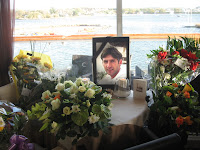Alcohol by Kalin Terziski is a powerful autobiographical account of the causes and effects of addiction. Terziski enlivens the daily grind of addiction with lightning flashes of anecdote and powerful emotions, recollected in the tranquillity of his present day self imposed abstinence. His hero is driven by a furious rejection of the moral compromises of his parents’ generation. In a bravura passage he lambasts lives of passive compliance, where the only rewards participation in the banal charades of communism are a monthly visit to a restaurant to eat overcooked pork chops.
Anyone seeking to understand the generation who spent their youth in the streaked sunset of communist rule, then had to endure its replacement by a kleptocracy, ought to read this book. Terziski casts an uncompromising light on himself, his fellow writers and the grim everyday hospital reality, where he worked as a trainee surgeon and then psychiatrist. For those readers who fear that this will be a depressing read, I can only say that the truth redeems, and the truth is often very funny.
If Terziski’s condemnation of his parents’ generation seems unfair, Mausoleum by Ruzha Lazarova redresses the balance. In a book that cannot decide whether it is family memoir or novel, Lazarova who lives in France and writes in French has written the most compelling account of life under communism that I have read. Through the experiences of the author, her mother and her grandmother we can chart the evolution of communism through terror, then enforced co-operation, then absurd ritual.
Shortly after the Russian invasion and “spontaneous” Communist revolution, Lazarova’s grandfather, a promising jazz musician was ordered to present himself at a Ministry Building. He joined unsuspecting fellow musicians and lawyers and was never seen again. Years later Lazarova’s grandmother received official notification that he had been executed as a Bourgeois parasite and enemy of the people.
Twenty years later Gosho the String, former society violinist, was arrested taken to a labour camp, murdered by inmates and fed to the pigs. His crime was a joke suggesting that the difference between British and Bulgarian postage stamps was that Bulgarian spat on both sides of the stamp.
The face on Bulgarian stamps at this time was that of Bulgaria’s first Communist leader, Georgi Dimitrov, who was by now embalmed and lying in state in a grandiose concrete bunker opposite the former royal palace in Sofia. Dimitrov had orchestrated the terror from Moscow, before returning to Sofia as an alcoholic, a flaccid instrument in the hands of Stalin’s KGB.
The mythology of the heroic “Father of the Nation” was mostly based on one event – the 1933 Reichstag Fire trial. The new Nazi government had arrested Dimitrov with two other Bulgarian Communists and had tried to frame them. Dimitrov successfully defended himself and was shipped to Russia as part of a prisoner exchange. There he became head of the Comintern – active in the liquidation of European Communist leaders.
The Mausoleum in which his body was housed from 1949 becomes the metaphor for Bulgaria under Communist rule. Lazarova evokes the changing attitudes reflected in the experiences of terrified grandmother, frustrated mother/engineer and rebellious daughter (herself).
The father of the nation loved children of course and so generations of children were rallied by shouting teachers and marched in all weathers into the cold formaldehyde tomb where they had to shuffle past the dead body. The Mausoleum was also the focus of all the joyful time wasting demonstrations in which workers and children celebrated their good socialist fortune by waving flowers and flags at the current politburo and their foreign guests.
As the years pass the emptiness of these charades becomes yet more apparent. There is a hopeless frustration felt by intelligent citizens forced to agree to lunatic decisions made by incompetent apparatchiks. But even in the 1980s as the failings of a corrupt regime are clear to all fear precludes any significant reaction beyond petty resistance.
90 year old broadcaster, journalist and informer, Petko Bocharov has published memoirs. In Pictures from Three Bulgarias he provides a series of sharply realised memories from his childhood in Tsarist Bulgaria, his education in the American College, his imprisonment in a Dimitrovgrad mine, his impressions of Communism and post-communism, and his ashamed confession to being turned into an informer for State Security.
What if on your first day in a Communist labour camp, labelled as a political, you are shown to a narrow bed, which you have to share with a thief/murderer, you leave your stuff including a hunk of bread on the bed as you have to visit the surprisingly clean latrine and when you return you find your bed-mate has eaten your bread?
Intellectual middle class Bocharov had taken boxing lessons. Success in the fight brought the patronage of the cock of the prison. Bocharov was honoured with a nickname and became his bed-fellow.
They don’t teach boxing in English schools.

